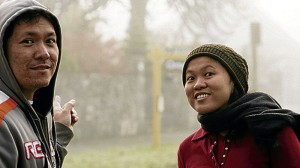Director Monster Jimenez recalls how making her documentary, “Kano: An American and His Harem,” took five long years.
“Production began in 2005 but actual shoot only started in 2007. We wrapped up in 2010,” Jimenez relates. “With docus, a lot more goes on than just the shoot itself. There’s the sleuthing, the research, the waiting for more funds…”
Jimenez’s producing partner, Mario Cornejo agrees: “Finding the story took us forever.” And then they had to take a trip to Oregon to interview their subject’s family.
It’s a complex and compelling story: Decorated American soldier and Vietnam War veteran Victor Pearson hies off to a far-flung, impoverished barrio in Negros Occidental, where he shacks up with hundreds of Filipinas until he finally gets slapped with charges for over 80 counts of rape.
Balancing act
Considering the “difficult” subject matter (which created a media frenzy in 2001), it was a tough balancing act for the duo.
“The biggest challenge was knowing when to stop—when to stop shooting, editing, when to just simply call it quits,” Jimenez explains.
“In a weird way, filming became the research part and the editing room is where we really found the film,” Cornejo notes. “By editing room, I mean a laptop on a dining room table.”
Jimenez adds, “It was mostly Mario who did the talking with Vic, because Kano (as he is called by the women) relates better with men. I interviewed the girls and women, because they were less shy around me.”
Cornejo notes: “Monster has a great energy about her. She’s genuinely interested in people, and is rarely ever judgmental.” This sobriety in the face of hysteria shines through in the film.
“Kano,” which has been shown in Iloilo and Zamboanga as part of Sineng Pambansa, in Bacolod for the Bacollywood) and in some other parts of the world, has elicited strong reactions—from walkouts to wild applause.
“I was surprised that some people thought we were condoning Vic’s actions,” says Jimenez. “We were very careful not to sensationalize, pander or criticize because we wanted people to think long and hard after watching the film.”
Not to preach
Cornejo concurs: “Our point was always not to preach, but to tell a story.”
Surely, the story of “Kano” has moved enough people for it to win awards—from the International Documentary Film Festival in Amsterdam, the Cinemanila and the Urian (as first-ever best docu).
“It feels good to get the nod of critics,” Jimenez says.
Cornejo cautions, “We can’t start making films for awards, as tempting as that is. I keep reminding Monster that we made this film to do something we’d be proud of.”
Another big reward, however, is that Jimenez and Cornejo will return to Cinemalaya, the indie festival where they made their debut six years ago with the comedy caper “Big Time.”
“Kano” will be shown on Saturday, 6 p.m., at Greenbelt 3 and on July 22, 6:15 p.m., at the Dream Theater of the Cultural Center of the Philippines.
